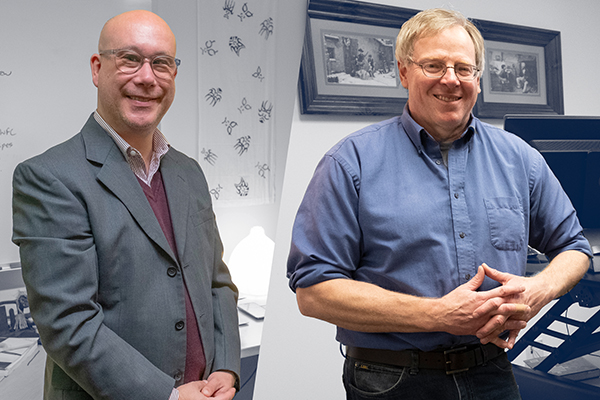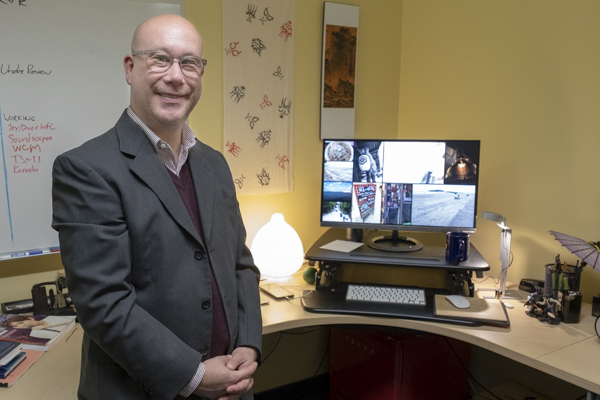UM-Flint faculty on what your workspace may say to others

How we personalize or organize our workspace can affect how we do our jobs and what others think of us. Associate Professor of Management Gregory Laurence, and Professor of Psychology Terrence Horgan, both UM-Flint faculty, discuss their related research in this Q&A.
Q: Can you summarize any completed research you have done on workspace organization or workspace personalization?
Laurence: I have two papers published in the area of workspace personalization. They show the following: In the simpler of the papers we find that people working in low privacy workspaces (cubicles or even more open spaces) can benefit emotionally from some degree of workspace personalization – burnout in the form of emotional exhaustion decreases for people in these contexts who personalize. In the more complex of the papers, we find that personalization serves a number of functions beyond communication of identity to others. The most interesting of these relate to interpersonal processes such as self-motivation and self-regulation of emotion and goal-setting.
Horgan: We conducted three experiments on this topic at UM-Flint. Our participants were randomly assigned to sit in a researcher's office (office A) that was made to appear either clean, organized, and uncluttered or somewhat messy (office B; experiment 1) or very messy (office B; experiments 2 & 3). Participants guessed the researcher's personality traits afterward. In all three experiments, participants thought that the office B researcher was less conscientious (e.g., more disorderly and less goal-oriented) than the office A researcher.
In experiments 2 and 3, participants also thought that the office B researcher was less agreeable (i.e., more difficult to get along with) and more neurotic (e.g., more emotionally labile) than the office A researcher. Our findings suggest that the degree of messiness in a person's office might matter in terms of whether people think that that person possesses one (somewhat messy; lower conscientiousness) or more negative personality traits (very messy; lower conscientiousness and agreeableness, and higher neuroticism).
By ascribing a group of negative personality traits to the researcher with the very messy office, our participants seemed to be generating a consistent impression of the researcher, and not a particularly good one at that. This researcher was perceived to more careless, uncaring, and cranky than the researcher who worked in the neat office.

Q: Why do people respond to a coworker's office space design? How can this affect professional relationships and collaborations? Is it different from a desk's level of messiness and how this affects coworkers' opinions?
Horgan: Like it or not, in the absence of other information about you, people will naturally form an impression of you based on what's available to them. Appearance cues may be all they get initially; cues that are part of you (e.g., your physical features and style of dress) or contained within your office (the design and upkeep of your entire office, not merely your desk) are part of that appearance.
Sometimes these impressions are accurate. Sometimes they are not. Either way, they matter. Consider a student (student A) who meets with their professor in the professor's office at the start of the term. The student notices that the professor's office is neat, clean, and organized. Another student (student B) does the same thing with a different professor, but her professor's office is very messy in appearance (disorganized, dirty, cluttered). Both students submit their first assignments to their professors the following week. Each professor takes a long time to provide feedback to his/her students. Student A might view his professor as a very careful grader, whereas student B might think her professor is too disorganized, insensitive, or stressed to provide feedback to her on time. In each case, the student is trying to make sense of the professor's behavior based on his/her initial, office-based impressions of the professor.
Laurence: I've honestly not looked much into "why" people respond to co-workers space. We respond to visual cues all around us, all of the time, so to me responding to how a co-worker's space looks is natural. The potential impacts on relationships are profound. We find in our research that people self-regulate, choosing what to display and not to display because of a knowledge that one should not personalize outside of norms. My colleague Oluremi Ayoko has shown that overtly cultural displays can be off-putting in certain contexts. Political affiliation can be off-putting in certain circumstances. This is definitely distinct from the question of "disorder."

Q: How would you describe your office workspace style? What do you think it says about you?
Laurence: My workspace is definitely designed to provoke questions from the people who visit. I have items from my travels around the world for work. I have items reminiscent of my time living in Asia. I aim for an open and inviting space in which people feel they can sit and not feel rushed. I hope it shows that when I encourage students to be open to opportunities in different places that I am just not "talking", but "walking the talk". I hope it indicates to them that I am open to new ideas and experiences.
Horgan: Close to nature captures my lifestyle and office décor. I live life as simply as possible. I try to have only natural materials and ingredients in the stuff that I use or consume on a daily basis. I make tea using the mint that I grow in my garden. I make my own toothpaste, deodorant, and hand lotion. I also make furniture for my house. My office contains many items from my children, former students, and colleagues that are about nature (trees) or are made from natural materials (wood, rock). These items relax me. They also make me happy and, I hope, more productive at work. Just in case you're wondering, my office looks neat and organized.
Q: Has your research into this topic spurred interest in researching other aspects of workspace design?
Horgan: In the future, we intend to explore whether a messy office might prime visitors of that space to behave in a more careless fashion, at least temporarily.
Laurence: My research to date has led me to a number of questions. Those that I am working on now are: How do sound and noise impact people at work beyond being a distraction? This seems especially important for people not working in office contexts. More broadly, I am interested in impacts of personalization over time. I notice that I do not do wholesale changes of the items in my office…so, does the effect on the items on me decrease over time? Would I get more benefit if I rotated items from home into my office to change its look every year? Every 2 years? On a really simple level, how impactful is the desktop picture on a PC compared to a plain colored background?
Workspace research is, I think, on a cusp. There are so many unanswered questions about something that is so important. Think about how much time you spend at work compared to other places….The spaces in which you do your work, work with people, etc. are as important as any other aspect of work, but still so under-researched.
Related Posts
No related photos.
- College of Arts, Sciences & Education
- Faculty
- Management
- Psychology
- Q & A
- Research
- School of Management
UM-Flint News
The Office of Marketing & Communications can be reached at mac-flint@umich.edu.